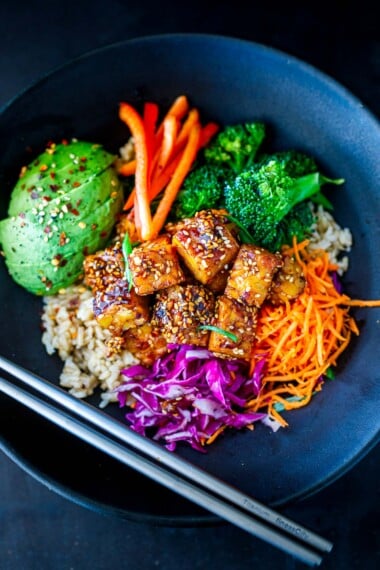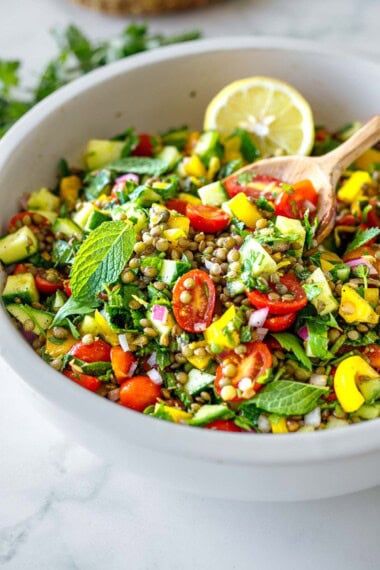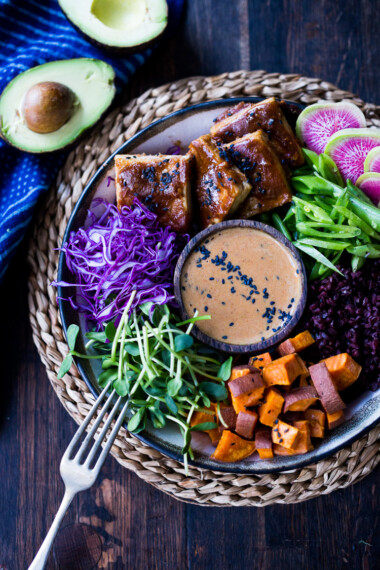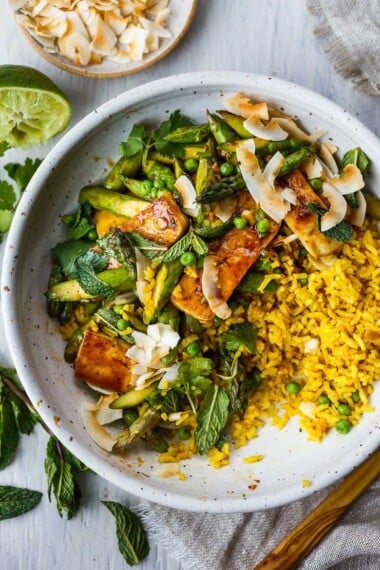Here is my Plant-Based Reset! We have a new meal plan with recipes and a grocery list! Restore balance, reset cravings, support the liver, and shed unwanted weight. Yours FREE when you subscribe.
What is a Plant-based Diet?
The plant-based diet consists of consuming whole foods that come solely from plants- fruits, vegetables, legumes, grains, nuts and seeds.
There is confusion between the vegan diet and whole-food plant-based diet due to their similarities, but the main difference is that the vegan diet permits overly processed foods (like vegan meats, cheese, and snacks), while a whole-food plant-based diet focuses on unprocessed, real foods.
While I think we are all genetically different and no single diet works for everyone, eating a whole foods plant-based diet can be very beneficial. Most diets, like vegan, keto, vegetarian, paleo, low-fat, low-carb, pescatarian, and carnivore, help people lose weight initially by eliminating processed foods.
Both the keto and carnivore diets can help people manage diabetes, reduce inflammation, and lose weight in the short term, but their long-term health effects are still unclear. The same goes for the vegan diet, particularly if it includes overly processed foods without focusing on quality and nutrient density.
Perhaps switching our diet occasionally is beneficial—cutting out overly processed foods and incorporating a wider variety of plants for gut health. “Cyclical eating,” or enjoying produce when it’s in season, feels nourishing and grounding. For me, being “plant-based” is more about including “all the seasonal plants” and reducing processed foods rather than strictly avoiding all animal products. But do what works for you. 🙂
My Plant-Based Journey
Every January, I elect to go plant-based for a month to reset my gut, support my liver, and balance out all the holiday indulging. I sleep better, feel more energized, and lose a little weight. The best part is it helps reset my cravings. If things get a little out of hand during the year, I’ll do a week here and there and always feel better. It’s a great tool!
My Best Plant-Based Diet Tips
- Protein first. Always start your day and all your meals with protein. In our guide, we share many high-protein meatless meals. Building all your meals around protein and fiber will keep you satisfied.
- Prep Ahead. Always try to have something ready for hunger “emergencies”. I always prep at least one soup and one salad to have at the ready.
- Sort through your fridge and pantry and physically remove any highly processed foods that may tempt you. Store them out of sight.
- Variety and Nutrient Density. Be conscientious about eating a variety of nutrient-dense foods that feed the good bacteria in your gut. Feed the guys you want to grow. If you eat sugar, you will feed and grow the gut bacteria that love sugar, and they will strongly influence you to eat more sugar! Here are our favorite dinner ideas!
PIN IT For Later!
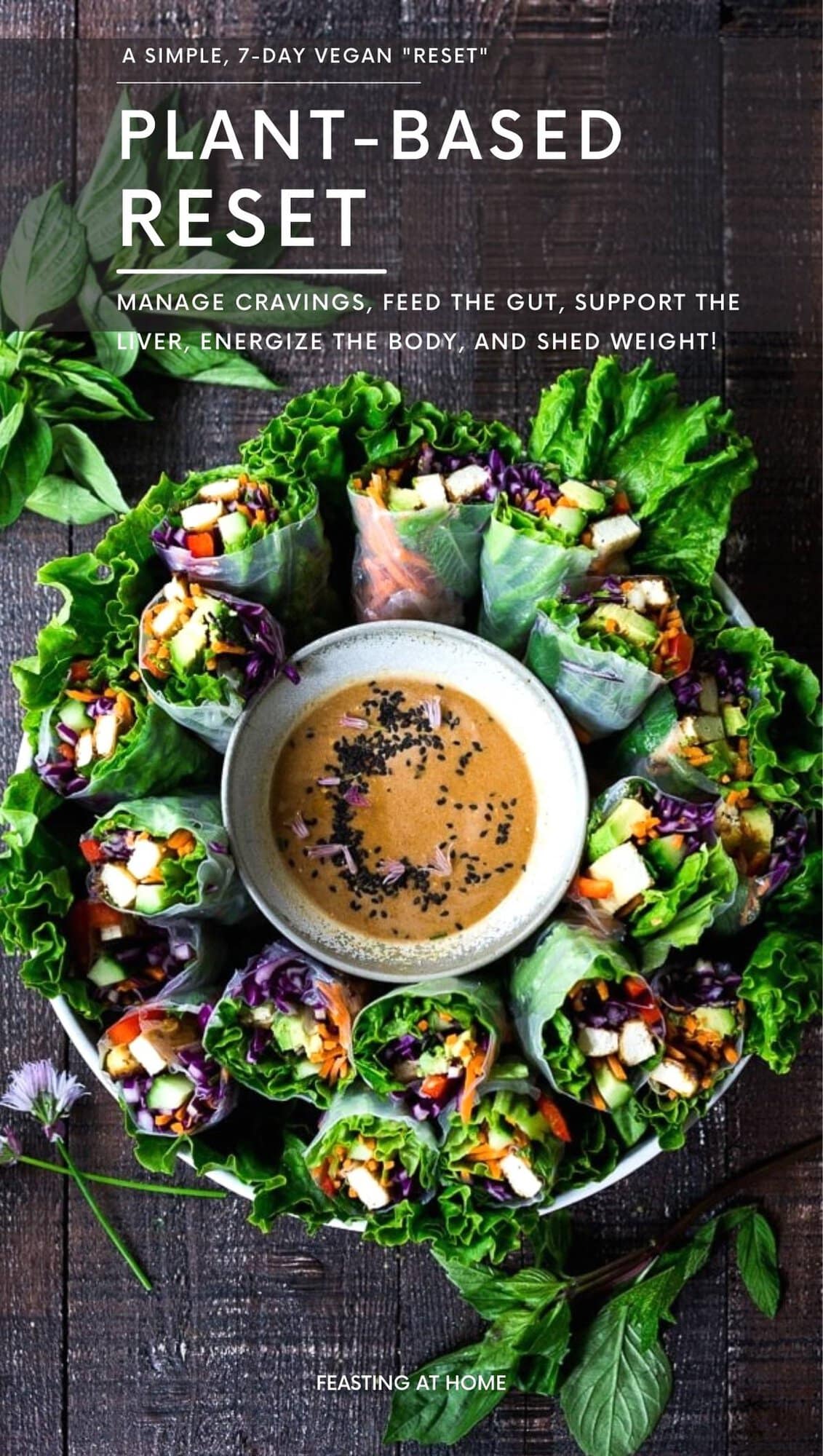
Can the Plant-Based Diet make you live longer?
New research is showing that eating a plant-based diet for a 3-month period can actually affect our DNA! Studies by Dean Ornish and others show how a plant-based diet affects the length of our telomeres and ultimately slows down the aging process.
Intermittent Fasting and the Plant-Based Diet
On a daily basis, I practice intermittent fasting most days, adopting a 14/10 fasting schedule –eating my meals within a 10-hour period, allowing my body to rest for 14 hours. This helps moderate insulin spikes and promotes autophagy.
An easy way to start is to eat within a 12-hour window for a few weeks, then gradually decrease this week by week to a 10-hour eating window. Decide if you would like to shorten this, based on how your body feels. Be gentle- too much fasting can increase cortisol.
For more information on the benefits of intermittent fasting, read this recent article from Harvard Medical School and this Wikipedia article. If you struggle with insulin resistance or type 2 diabetes, I highly recommend that you research this. It is absolutely reversible.
What to Expect
In my Plant-Based Diet Guide, I lay out a list of things to begin your journey. Please don’t feel like you have to do ALL these things in the first week (unless you really want to jumpstart your body). I’ve found that lasting success comes from gradually and gently incorporating these changes into your life so they become a more lasting habit.mAlso, if you are not used to eating many plant-based foods, gradually adopting the diet will allow your gut microbiome to grow the healthy bacteria needed to better digest these veggies!
Weight will come off a little more slowly, but this is a good thing, and this way it will most likely last. So go ahead and start with just one or two things this week. Then next week add another, and then another the following week so it’s not so overwhelming or dramatic. This is not intended to be a crash course diet, but rather a lifestyle change for increased energy, vibrancy and gradual weight loss, with a “jumpstart” option if you are so inclined.
*For the record, I’m not a dietitian and I’m not here to try to convince you to become vegan (please do your own research first) but rather to show you simple ways to include more nutrient-dense, whole-food, plant-based meals into your life, and try to help wean you off of ultra-processed foods.
Not only does the plant-based guide contain helpful tips and tricks to make the transition easier- it contains delicious whole food, Vegan Recipes that will keep you feeling vibrant, energized, and satisfied! A week without processed foods does wonders for the body.
10 Benefits of a Plant-Based Diet:
Food Groups of the Plant-Based Diet
So the Simple 7-Day Reset begins with cutting out highly processed foods (even vegan ones!) and eating real, whole food, made from scratch. AND Don’t worry- we make it simple!
- Legumes and Protein– lentils, chickpeas, all beans, tofu, and tempeh.
- Vegetables– dark leafy greens, brassicas, tubers, winter squash, peppers, zucchini, eggplant, and all the veggies
- Nuts and Seeds- walnuts, almonds, pecans, sesame seeds and tahini, hazelnuts, sunflower seeds, pumpkin seeds, nut butters.
- Whole grains– quinoa, brown rice, black rice, teff, wild rice, millet, rye berries, buckwheat, farro, etc.
- Fruits– prioritze berries and any type of fruit- apples, citrus, mangos, bananas, pineapple.
- Microgreens, fresh herbs and spices!
By consuming whole foods, you nourish your body with nutrient-dense ingredients, which provide REAL nourishment – while feeding your healthy gut bacteria, and protecting your liver …allowing our body to do what it naturally does… balance and heal itself.
When we truly nourish our bodies with REAL food, we find we don’t crave junk food as much. In the process, we also help reset our cravings, by feeding our “good” gut bacteria, strengthening THEM, and amplifying THEIR hunger signals for more plant-based foods.
So, though I am not technically a full-time vegan, on most days, I eat a huge variety of plants with the occasional wild fish, seafood, or grass-fed meats.
Subscribe to the blog and get my free 7-DAY, PLANT-BASED RECIPE GUIDE and make some simple changes starting today! Once you sign up you’ll receive the list of things you can start implementing into your daily routine, along with some simple delicious recipes!
This is absolutely FREE and there no strings attached, ever. 🙂
There are many paths to health, and my hope is to inspire and motivate you to find your own. Take inventory of how you feel and start taking responsibility for your health.
This is not your doctor’s job- this is your job. We only get one body while we are here… and our food choices absolutely impact our health. We have more power than we are led to believe. If you looking for a way to get off prescriptions, please look up a “functional medicine” doctor in your area.
